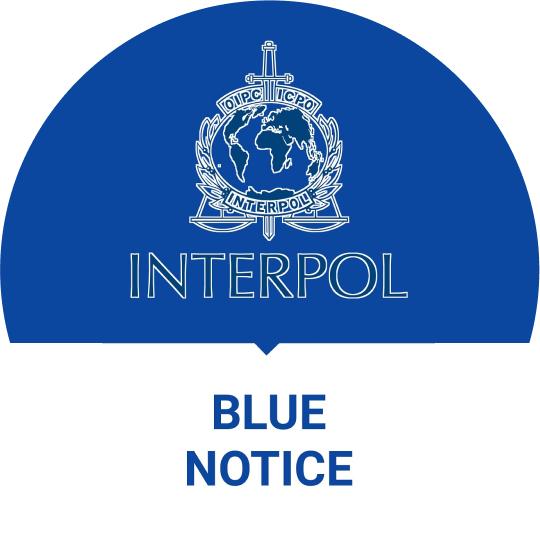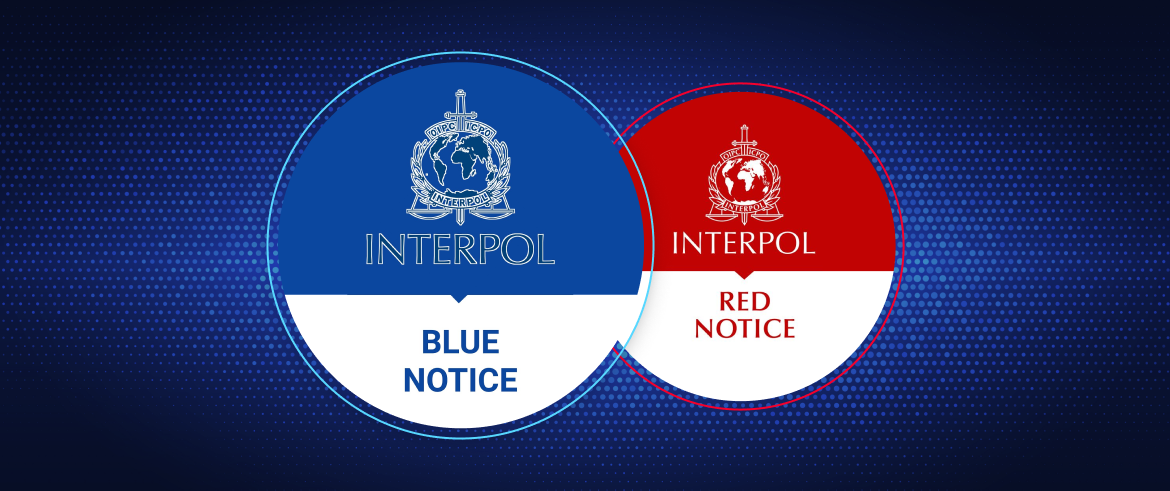
Interpol Blue Notice
The Blue Notice is a vital tool for global law enforcement, facilitating intelligence sharing and collaborative efforts united nations to apprehend criminals. It is public safety and promotes trust and international cooperation in upholding the law and protecting public safety for citizens worldwide.

- What is Interpol's Blue Notice?
- How is an Interpol Blue Notice Issued?
- Who is the Subject of the Blue Notice?
- Red Notice vs. Blue Notice
- How to check Interpol Blue Notice?
- How Can a Blue Notice from Interpol Be Challenged?
- How to Remove Interpol Blue Corner?
- Legal Representation in the Field of Extradition, Interpol, and Blue Notice removal
- Interpol Blue Notice FAQ
What is Interpol’s Blue Notice?
Interpol Blue Notice is one of the notices of the INTERPOL network, used by international police to track the location of individuals who may be of interest to the investigation. It is aimed at collecting additional information about suspects and missing persons involved in crimes, but for whom there is not yet sufficient evidence to issue a red (wanted for temporary detention) purple notice, green notice (warning of a potential threat), or yellow notice.
The Blue and black notices contain the person’s identity and basic identification data (name, date and place of birth, nationality, photographs, and fingerprints), as well as a description of the suspect’s identity, possible crimes, and location. The blue and green notices help and are sent to all INTERPOL member states so that they can provide information that will facilitate the search and identification of the person.
INTERPOL issues Blue Corner Notices to:
- Locate a person;
- Collect additional information about the activities, connections, or possible crimes of a person;
- Identify a person.
Blue Notice does not necessarily imply the detention of a person, as it does not contain a request for an arrest. It only asks member states to provide information about wanted persons and their whereabouts or activities. Any decision to detain or restrict freedom remains at the discretion of national authorities and depends on the legislation of each individual country.
How is an Interpol Blue Notice Issued?
INTERPOL issues a Blue Corner Notice at the request of the General Secretariat or the International Criminal Court. The request must contain the following information about the suspect: personal identification data, photograph, date and place of birth, fingerprints, crime details, possible location, and expected travel routes.
Once checked and approved, the notice is sent to all INTERPOL member countries. Suspects are informed of the legal consequences of the issuance of a Blue Notice in the member countries in the following ways:
- Through national law enforcement agencies;
- Through national and international databases;
- Through contacts in government agencies;
- During document checks at the airport or in other places.
Once approved, the Blue Notice is sent to all other member countries via the special I-24/7 data exchange system. The National Central Bureaus are involved in this process, providing the necessary information on individuals subject to surveillance, as well as requesting data on missing persons from other member countries. Based on the information collected, the competent authorities can assess further action, such as making an arrest or launching a more in-depth investigation to locate missing persons.
Who is the Subject of the Blue Notice?
Interpol Blue Notices can be issued to a variety of categories of individuals: accused, suspects, witnesses, and victims. They enable law enforcement agencies to share information to assist in the investigation and prosecution of such individuals. The main groups for which such blue notices are often triggered include:
- Transnational criminal groups: individuals involved in smuggling, drug trafficking, arms trafficking, and cultural property trafficking. A Blue Notice allows countries to monitor the movements of members of criminal organizations and gather information on how they cross borders, the routes they use, and who they interact with;
- Terrorist suspects: tracking individuals suspected of terrorist activity or with links to terrorist groups, identifying routes, possible supply chains, and contacts that could help uncover a wider terrorist network;
- Economic crime suspects: individuals involved in money laundering, corruption, and other economic crimes, especially if their activities span multiple countries. An Interpol request can help obtain information on assets, possible banking transactions, and movements to confirm suspicions and gather evidence for further investigation;
- Witnesses: Blue Notices can also be issued against individuals who hold important information, facilitating the collection of data and further investigations;
- Illegal immigrants: individuals who are in the country without the appropriate authorization or documentation. They can be issued a Blue Notice to establish their identity and arrange for their return to their country of origin.
A Blue Notice allows for the international criminal court and international criminal police organization for the tracking of suspects and potential witnesses to criminal activities committing crimes, as well as war crimes, and the collection of information on international criminal activity. It is not mandatory, and each country decides for itself what measures to take against individuals based on its national laws.
Red Notice vs. Blue Notice

Interpol Blue Notice is an information request that is used to locate, identify, and track a third person’s criminal activities. Unlike a Red Notice, it does not require an arrest warrant or detention but serves to obtain additional information about the subject.
Interpol Blue Notice is an information request that is used to locate, identify, and track a person. Unlike a Red Notice, it does not require an arrest or detention but serves to obtain additional information about the subject. A Blue Notice does not oblige countries to take any legal action against a person. It is most often used for individuals involved in transnational crime, but for whom there is not yet sufficient grounds for arrest.
So, the main difference between the two green notices and Interpol blue notices, and these cards removing blue notices Interpol red notices, is their purpose (Red Notice – a request for temporary arrest and subsequent extradition, Blue Notice – a request to collect additional information), the mandatory nature of the action (in some countries, a red notice is used as an arrest warrant, a blue notice does not require legal action or detention), and the subjects of the notice (Red Notice – seek persons wanted, accused or convicted persons, Blue Notice – suspects, witnesses and persons with information important to the investigation).
It is also worth noting the likelihood of cases when Interpol issues interpol blue notices before red notices or color coded notices before blue notices or a blue notice before a Red Notice or diffusion notice, in order to expedite the arrest of a person for extradition, prosecution or serving a sentence. Therefore, it is extremely important to obtain qualified legal support as soon as possible to take proactive measures.
How to check Interpol Blue Notice?
As a member of the public, it is not possible to directly check if someone is subject to an Interpol Blue Notice. However, if you have relevant information about an individual or criminal activity that may be of interest to international alert and law enforcement agencies, you can contact your local police or Interpol National Central Bureau (NCB) to report it.
To check if you are subject to Blue Corner Notice Interpol, you can contact your local police or Interpol NCB to inquire about any information they may have on file about you. It’s important to note that Interpol only shares information with law enforcement agencies, and they do not provide information to public or private individuals.
Overall, the best way to check Interpol Blue Notice is to contact your local or international law enforcement or agency or Interpol NCB for any information or assistance regarding a criminal investigation.
How Can a Blue Notice from Interpol Be Challenged?

An order seeking removal might be contested for a variety of grounds, including the right to a fair trial and the fact that it was issued for non-political, military, or other unlawful reasons (read more about removing a Red Notice here). Sometimes a situation is not totally clear, and the political purpose of the Interpol Notice is not immediately obvious. In such circumstances, the legal assistance of counsel might be critical in providing relevant evidence and obtaining a successful challenge to orange notice.
How to Remove Interpol Blue Corner?
Information regarding Interpol Blue Notice search is not publicly available and can only be obtained by a lawyer or upon official request from law enforcement agencies. In order to challenge and remove critical crime related information from a Blue Corner Notice from the Interpol database, you must submit a request to the Commission for the Control of Files (CCF). This is an independent body of Interpol responsible for all criminal investigations and processing requests to remove blue notices critical crime related information, that violate the Organization’s Charter.
Prepare documents supporting your position: evidence of the absence of legal grounds for issuing notices, witness statements, court decisions and other documents. The request must be submitted in writing in one of the official languages of Interpol (English, French, Arabic, Spanish) and contain a brief statement of your position, the facts of the case and the legal grounds for the removal request or its cancellation. (English, French, Spanish, Arabic).
A qualified lawyer will help you correctly draw up an application, collect the necessary evidence and formulate a legal strategy.
Let’s consider the possible grounds for appealing an Interpol Blue Notice:
- The notice is based on inaccurate or incomplete information. For example, you can provide evidence of the legality of the person’s activities and the absence of his/her involvement in crimes;
- The notification violates the Interpol Charter (prohibition of use for political, military, racial or religious purposes);
- The notification violates basic human rights, restricts freedom of movement or creates risks of unlawful prosecution;
- The notification is based on outdated data, when suspicions have already been removed or the investigation has been terminated.
Involving a lawyer increases the chances of successfully challenging the notification; a qualified specialist will help to seek information and form an effective evidence base in accordance with all procedural requirements of the CCF.
Legal Representation in the Field of Extradition, Interpol, and Blue Notice removal
If you have been the subject of an Interpol Blue Notice, do not hesitate to contact a qualified lawyer. Our company’s specialists specialize in this area and have extensive experience in such cases. An experienced lawyer will assess the legal grounds for a Blue Notice and its compliance with the Interpol Charter. We will prepare an individual defense strategy for each client, taking into account the specifics of their case, collect all the necessary evidence to challenge the notice and file a corresponding request to the CCF.
Our team accompanies clients at all stages of the process representing the request review: filing an application in accordance with all Interpol requirements, interacting with the CCF Commission on any additional issues, constantly monitoring the process and regularly notifying the client about the progress of ongoing investigations in the case. In case of refusal, we are ready to develop additional strategies, re-apply or appeal to higher international authorities.
In addition, our specialists provide competent online consultations for clients from all over the world. If a personal consultation is required, our lawyers are ready to fly to the relevant countries. Our services are available in a variety of languages, including English, Russian, French, Spanish, Chinese, Portuguese and Turkish. Encrypted communications are also possible.
Contact us now for more information and to develop an effective legal defense strategy for your situation.

Interpol Blue Notice FAQ
NCB New Delhi (India's National Central Bureau) recently requested a Blue Notice against the promoter of Winsome Diamonds, a Mumbia-based firm that makes diamonds for export. Mr. Jatin Mehta, the promoter, is being sought in connection with a debt default case. While the NCB New Delhi had already issued an Interpol Red Notice against Mr. Mehta in 2018, the sequence of events that led to the Blue Notice request is quite unique. The complaint claimed:
- "On the basis of assurances from the Indian bank, [Winsome Diamonds] acquired gold from three bullion banks abroad—Bank of Nova Scotia, Standard Bank, and Standard Chartered Bank."
- and [allegedly] neglected to pay for gold imported on the basis of the promises."
According to Interpol's constitution, a blue notice helps to obtain information on a person's identity, whereabouts, or activities in connection with a criminal inquiry.
Interpol Blue Notices serve a similar purpose as Interpol Red Notices, however they are not the same. Blue Notices are used to request law enforcement worldwide to gather further information on a person's criminal activities. However, a Blue Notice refers to a suspect's or witness's movements but does not call for their arrest. It is also not a global arrest warrant.
As a result, the individual to whom the warning relates may not be wanted for a crime committed or may have already been convicted. They may instead seek information through this method since they may be able to give further information on criminal proceedings.




